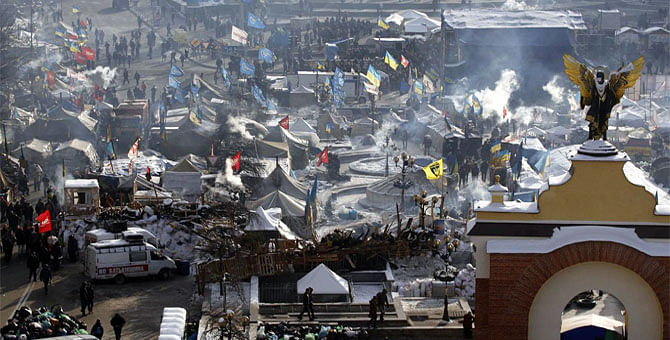Ukraine MPs to hold crisis vote

Ukraine's parliament is expected to vote on plans to scrap a new anti-protest law in a special session called over the ongoing unrest in the country.
President Viktor Yanukovych has offered to repeal the legislation, but it is unclear whether MPs will back him.
Opposition to the law has helped fuel deadly clashes between anti-government protesters and police.
Parliament is due to tackle other opposition demands, such as an amnesty for arrested activists.
Yanukovych offered an amnesty only if protesters cleared barricades and stopped attacking government buildings. So far, there has been no sign of protesters leaving the streets.
He made the concessions during talks with the three opposition leaders on Monday.
Meanwhile, top EU diplomat Catherine Ashton has brought forward a planned visit to Ukraine by 48 hours and will now arrive on Tuesday for meetings with Yanukovych and opposition leaders.
She said she was "alarmed" by reports on Monday that the government was preparing to introduce a state of emergency.
Multiple reports had suggested that the government was intending to invoke a state of emergency, but officials later said they had no such plan.
'Liability'
Activists continue to occupy Kiev's central square and government buildings in a number of Ukrainian cities, saying they will not leave until Yanukovych resigns.
The president began the latest round of talks on Monday evening with Fatherland leader Arseniy Yatsenyuk, Udar (Punch) chief Vitali Klitschko, and nationalist leader Oleg Tyahnybok.
He repeated an offer to Yatsenyuk to assume the post of prime minister, which Yatsenyuk formally turned down.
In a statement on the presidential website, Justice Minister Olena Lukash was quoted as saying that the "liability of the government" would be discussed in parliament on Tuesday.
Correspondents say ministerial changes could be on the agenda.
Yanukovych's Party of Regions dominates parliament, reports the BBC's David Stern in Kiev.
But it is still not clear whether deputies will agree to vote to revoke the anti-protest legislation, our correspondent adds.
In a call to Yanukovych on Monday, US Vice President Joe Biden urged the government to repeal what he called the "anti-democratic" protest law.
Demonstrators have demanded the legislation be repealed, but they also want the president to stand down.
The law was hastily passed in parliament by Yanukovych loyalists on 16 January.
The changes included a ban on unauthorised tents in public areas, and criminal responsibility for slandering government officials.
Unrest has spread across Ukraine, even to Yanukovych's Russian-speaking strongholds in the east.
Four activists have died in incidents connected with the protests in recent days.
The crisis was sparked when Yanukovych pulled out of a trade deal with the EU last November in favour of a $15bn (£9bn) bailout from Russia.

 For all latest news, follow The Daily Star's Google News channel.
For all latest news, follow The Daily Star's Google News channel. 



Comments